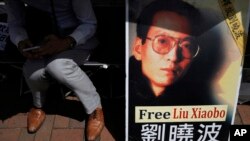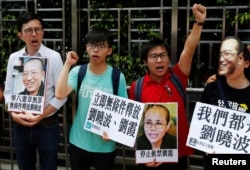As uncertainty about the health of critically ill Chinese Nobel Prize Laureate Liu Xiaobo grows, condemnation of the government’s refusal so far to let him seek treatment abroad is building overseas and at home.
In the past, China has allowed prisoners of conscience to be transferred, but such cases are rare. The last time China released a political prisoner on medical parole to the United States was in 2005.
China’s Foreign Ministry has brushed aside offers from the United States and Germany to treat Liu overseas and fulfill his dying wish that he and his wife be allowed to go abroad. And on Tuesday, state media stated that China will not yield to Western pressure and attempts to politicize Liu’s cancer treatment.
Analysts and activists say that ultimately what happens next to China’s most well-known political dissident is up to the country’s powerful leader, Xi Jinping. And how he chooses to handle the situation will have an impact on his legacy.
Xi is not only president and head of the Communist party and numerous other government working groups, he has been named the party's “core leader” and is much like an emperor, says Hu Jia, a Chinese rights activists and friend of Liu and his family.
"Liu Xiaobo's life is at the mercy of Xi Jinping and in his ultimate power as he is the core (of the party),” Hu says. “All Xi needs to do is utter the words; he doesn't need to consult anyone else. If he does, Liu stands a chance to live. If he does not, Liu shall die.”
Hu adds that while the confidence Xi now enjoys rides on the back of China's money and growing international influence, that does not always mean respect follows.
In 2005, when China was preparing for the 2008 Beijing Olympics and apparently more conscious of international perceptions, it agreed to release Uighur activist Rebiya Kadeer to the United States for medical treatment. In return, Washington dropped a resolution against China at the United Nations Commission on Human Rights.
More than a decade later, things have changed dramatically. Given China’s global influence today, there’s little the international society, including the U.S. and Germany, can offer to have China think twice about letting Liu go, said Zhang Lifan, a prominent Chinese historian.
Analysts say China may also be concerned that by letting Liu travel overseas, he or his wife could become a threat to the party ahead of a high level political reshuffle later this year.
During Xi’s time in office so far, at least three imprisoned political activists (Cao Shunli, Pang Ming and Tenzin Delek Rinpoche) have died in custody, all from health issues.
Although Liu was sentenced to 11 years in prison in 2009, well before Xi rose to power, many would argue that China today is even more tightly controlled than when Liu and others penned Charter 08, an online petition calling for sweeping political reforms.
Since his arrest and sentencing, Liu has been cut off from the outside world and his wife kept under house arrest. She has never been charged.
Liu was recently diagnosed with terminal liver cancer and released for treatment.
“Although now he has been released on so-called medical parole, he has no freedom of expression; he has no freedom to see his friends,” says Patrick Poon, a China researcher with Amnesty International.
The way he is being treated is still very harsh, and “if he eventually dies in such a situation, it will become a historic error (for China) because for many generations, people will still remember how China treated its own Nobel Laureate,” said Poon.
Such an approach could also deeply upset the country’s moderate democratic actors from both within the Communist Party and in the private sector, making them feel so cornered that they either turn reclusive or become die-hard opponents, says Zhang Lifan.
Such a heavy-handed approach will be like “a high-pressure cooker with all of its exhaust valves being tightly sealed by China,” he says. “People may stay silent for a period of time, but you never know when things will explode, since there is no way the pressure can be lessened and that will be a very dangerous development.”
Efforts by both Jared Genser, a U.S.-based pro bono lawyer who is working with Liu and his family, and German diplomats, continued Tuesday, even as the ailing dissident remained in critical condition.
Germany’s Foreign Ministry says it had several high-level discussions with the Chinese side. The ministry said the Germans “continue to stand ready to accept Liu Xiaobo for medical treatment in Germany.”
German Chancellor Angela Merkel has also spoken about the case. Late Monday, Merkel’s office asked Beijing for a “sign of humanity for Liu Xiaobo and his family.”
Many of Liu’s supporters in China have drawn comparisons between his current fate and that of German activist Carl von Ossietzky, who was awarded the Nobel Peace Prize while being held in a Nazi concentration camp.
Ossietzky ultimately died of tuberculosis under the watch of secret police.
Ye Bing contributed to this report












